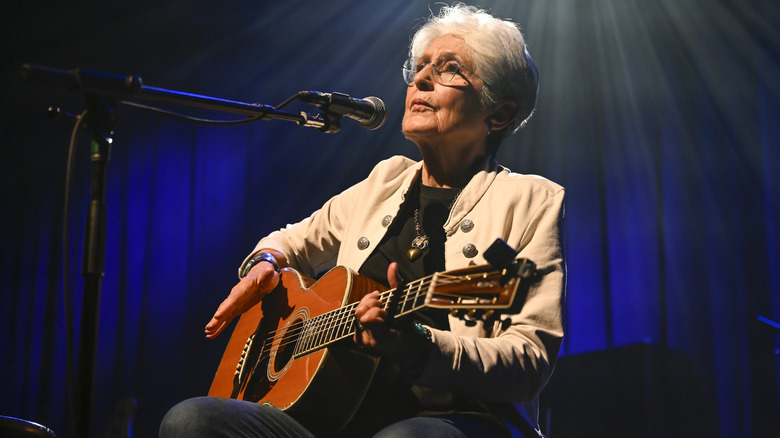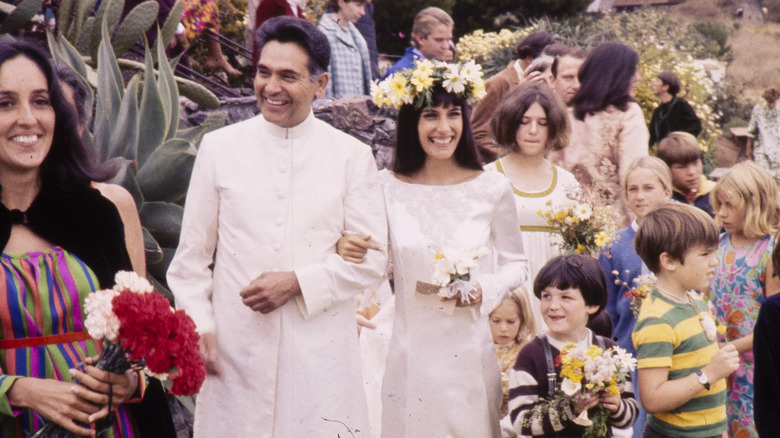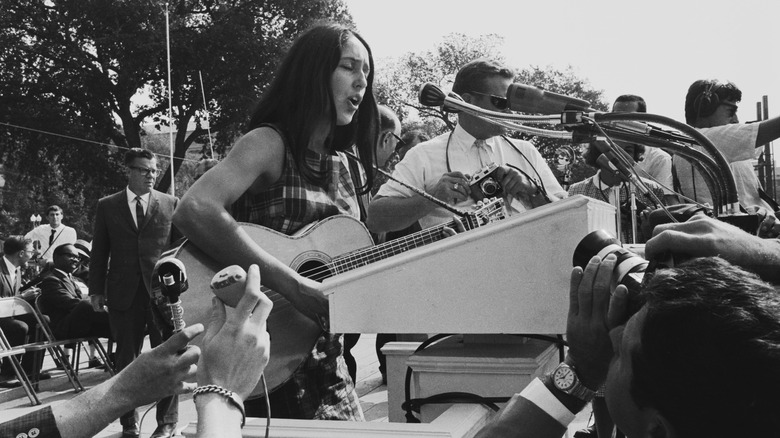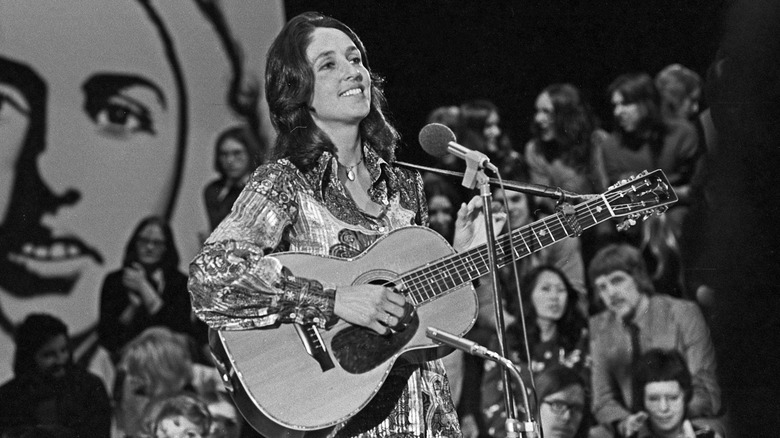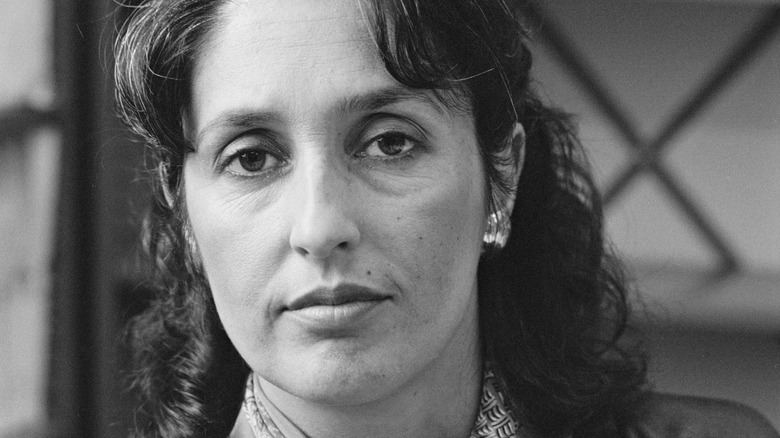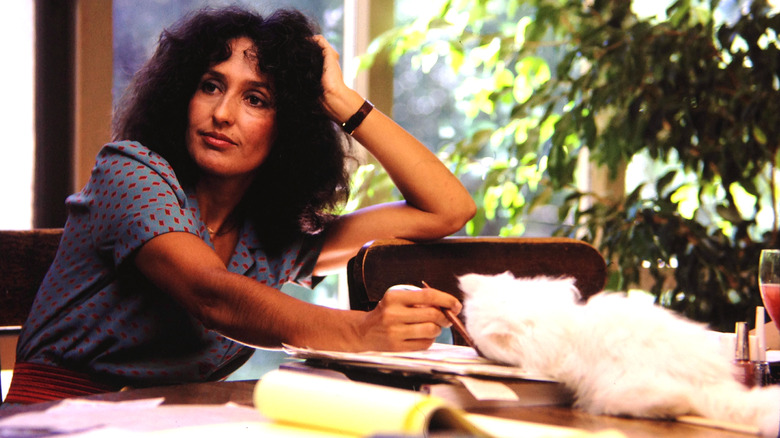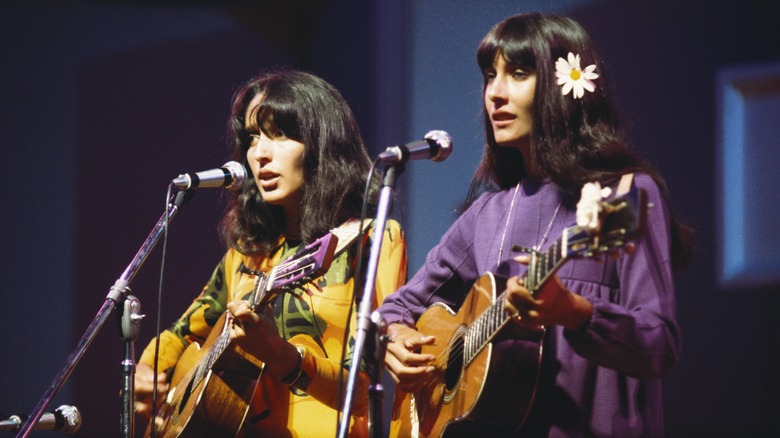The Untold Truth Of Joan Baez
In 2018, Joan Baez announced that she was bringing her decades-long career to an end with one final tour, and an album: "Whistle Down the Wind." It was a decision that had been a long time in the making, and she told The New York Times that she had ultimately left it up to something that was sort of out of her hands. "I asked my vocal coach many years ago when it would be time to stop, and he said, 'Your voice will tell you.' And it has — it's a muscle, and you have to work harder and harder to make it work."
Baez said that it was harder and harder to hit the notes that had made her career — and had once made Bob Dylan describe her like this (via The San Diego Tribune): "She was something else, almost too much to take. Her voice was like that of a siren from off some Greek island. Just the sound of it could put you into a spell. She was an enchantress. ... She'd make you forget who you were."
Her incredible musical career is only part of the story, though, and Baez has also created a legacy of political activism and demonstrations of just how powerful nonviolent protests can be. At the same time she gave a voice to those with none, her own life has been filled with ups and downs — even those that many of her biggest fans may not be aware of.
Her father was a world-changing scientist
Joan Baez released her Spanish-language album in 1974 and has said (via The Mercury News) that she was never a fluent speaker, even though her father spoke it at home. It's entirely possible that the lessons didn't stick because he had little time to be consistent: When he died in 2007 at the age of 94, his obituary in The New York Times revealed the kind of life, experiences, and contributions that most people can only dream of.
Albert Baez (pictured, with daughter Mimi) had degrees in physics and math from Drew, Syracuse, and Stanford Universities, and it was while he was at Stanford that he and his research partner started studying the possibility of using mirrors to focus x-rays in a way that would allow for the microscopic study of living cells. The tech he put forward in the thesis for his PhD is still in use today — it's the basis of the technology that's widely used in sciences from medicine to astronomy.
Post-college, Albert — and his family — traveled all over the world as part of his work developing educational curricula. They lived in Paris for a while, Iraq, and Boston, and for years, focused on educational programs in developing nations. He wrote of his core beliefs (via the Los Angeles Times): "Science is one of the things needed in these countries if you're going to have a base for a future economy. Otherwise, they'll always be the servants of the United States."
Her early experiences with racism and lifelong dedication to civil rights
Joan Baez's work as a civil rights activist has been well documented, but perhaps less well documented is the fact that she had deeply personal reasons for lending her voice to movements and marches for equality and peace. Back in 1962, Time did a piece in which they took a look at her own experiences with racism. They were both terrible and at the same time, all too predictable.
The family moved around with Albert Baez's work, and they were living in a suburb of Buffalo, New York (while he worked on a research project for the military) when they discovered they had a neighbor who thought the color of their skin made it necessary to drop that racial-slur-that-will-not-be-repeated. That's downright awful, and when they moved to California, things got even worse.
When young Joan found her school divided into strictly segregated groups, it had a deep impact on her. She made it clear that she didn't want to grow up in a world like the one that she saw forced upon her, and as an interesting footnote, the now-dated magazine piece shows how far things still needed to go. The writer describes her "long almond face," "semi-Oriental" clothing choices, and her voice as being reminiscent of "black women wailing in the night... and of saddened gypsies."
One performer made her realize music could be her life
While there are a ton of talented performers, there's only a handful of supremely surreal voices that have the sort of quality that makes it seem as though they're from another world. Joan Baez has one of those voices, and when she spoke with The Washington Post about her decision to retire, she shared the fact that she always saw her voice as something that she sort of had nothing to do with.
She says it's "the gift," and explains, "If I view it that way, then I can appreciate it and talk about it for what it is, not something I created. It helps me stay grateful." Still, Baez didn't just assume that she was destined for a career in music.
She told The Telegraph that although she'd gotten her start playing in small coffee houses, she wasn't prepared for it when Bob Gibson brought her up on stage for one of his concerts. "... it looked like the largest gathering of people on earth," she recalled. I felt as if I'd been invited to my own execution." At that point, she hadn't been considering music as a serious pursuit for long: She was 13 years old when she saw Pete Seeger (pictured with her) perform at a benefit concert, and she cites that as the moment that changed everything for her.
Her activism came with a major dose of realism
Standing up to the status quo in an attempt to get some large-scale change done is intimidating, and when CBS Sunday Morning spoke with Joan Baez in 2023, they asked her about what was going through her mind during the civil rights movement. Her answer was surprisingly sobering and just as sad: "I was smart then, and I was smart enough to know that 'We Shall Overcome' did not mean, probably, in this lifetime."
In a conversation with The Hollywood Reporter, Baez said that the 1960s and '70s were sort of a perfect storm of "extraordinary politics and meaning and power and risk-taking and marches, and you can't recreate that." And here's the thing: Even though there's a lot that's changed since then, there's still a lot that needs to change. Baez was asked about that, too, and if she thought that the rise of the far-right in America would kick-start a new generation of protest singers.
She was hesitant, for the simple reason that it's far more dangerous in the 2020s than it was in the 1960s. In another 2023 interview with AARP, she spoke a little bit about the state of modern activism, too, saying that she was pretty shocked at where things had gone. "I didn't know that this country would be zooming toward fascism at this rate of speed. In some ways, it seems like we've come so far and in other ways, we've gone backward or in the wrong direction."
She had never seen her own personal archive
When The Hollywood Reporter reviewed the documentary "Joan Baez: I Am a Noise," they were shocked at how much new information the film shared. It turns out that there's a very good reason for that, and it's that directors Karen O'Connor, Miri Navasky, and Maeve O'Boyle were given unprecedented access to a vault of information that Baez herself had never ever seen.
Baez — who says that she trusted O'Connor partially because they had been friends for a long time — explained that the documentary had started out as a career-ending sort of wrap-up, but evolved when "I opened up the storage unit. I'd never seen it myself. But it turns out my family kept every letter anybody ever wrote. Every little tape I sent them from the road. It was all in there. I had no idea."
And it took a lot of trust. Letters and drawings, even recordings of therapy sessions, home movies... There's a lot about our lives that just sort of fades from memory, and Baez described the experience (via Salon) as "the bone-shattering task of remembering." O'Connor told Variety that Baez had given them full access while not having the final say over what was or wasn't in the documentary, and that's huge. But Baez says that it wasn't hard, once she made the decision — she knew that if she tried to go through it all, nothing would ever get accomplished.
She came forward with accusations of a childhood sexual assault
When she spoke with CBS Sunday Morning around the release of her documentary, she was heartbreakingly candid about the fact including her memories of being sexually assaulted — by her father — as a child. She said the calmness she embraced while on stage was the exact opposite of what she actually felt, and that much of that inner turmoil was caused by something that both she and her sister came to remember as adults.
She described it as a sexual inappropriateness that remained partially obscured by the shadows of time, memory, and trauma. Although her parents denied anything of the sort happened, Baez says, "Many parents who have been involved in this cycle, and their kids accuse them, they don't remember. I wanted to remember. I couldn't, until I was 50 years old. And they blocked it out."
Baez went on to say that she felt it was a secret she needed to keep until the deaths of both her parents and her sister, and said that coming forward was to start the healing process. In a conversation with Variety, she said that hearing recordings of her father's denial was one of the hardest parts of making the documentary. "Because I love my dad, and I can't stand that part where he's talking on the tape recorder. Because his reality is what it was. I have no doubt that he was completely unaware of [us] remembering things."
If you or anyone you know has been a victim of sexual assault, help is available. Visit the Rape, Abuse & Incest National Network website or contact RAINN's National Helpline at 1-800-656-HOPE (4673).
Her lifelong commitment to pacifism is thanks to the Quakers and MLK Jr.
Campaigning for social justice is only part of Joan Baez's beliefs, and like Martin Luther King Jr., she also championed nonviolent protest as a means to an end. In 2018, The Washington Post covered her appearance and concert in Charleston, where she spoke on the importance of the younger generation's continuation of their work. As part of the program, she shared the moment that nonviolent protest became so important to her: It was 1956, and MLK Jr. was speaking to a group of teenagers in Monterey. "He started to talk and I started to cry. I just couldn't get hold of myself, because he was doing what we were talking about."
His work built on part of her own upbringing as a Quaker, and she explained that "What I remember first was understanding that human life came before the flag, and that made sense to me." In an interview with Trafficbeat Entertainment (via The Huffington Post), Baez shared that her father had converted after finding meaning in Quaker meetings, and those teachings established her fundamental beliefs in pacifism.
Then, when she was 10 years old, two things happened: She read Anne Frank's diary, and the family moved to Baghdad at the behest of UNESCO. She told The Telegraph that it was the first time she had seen people living in true poverty, and it was something she carried with her for the rest of her life.
She shared some lessons from her X-rated Burning Man experience
Inevitable generational conflicts aside, The Guardian asked Joan Baez what she thought were the best and worst things that came from her generation, and she pointed to Burning Man as an institution that gave what she thought were some of the most important lessons that needed to be passed down.
She said that she hadn't gone until 2013-ish, and said that she'd waited so long because, at a glance, she thought that the whole, "self-sufficiency, living-in-the-desert, no-creature-comforts" thing just wasn't for her. But when she got there, she said she found an incredible community of people who relied on each other, helped each other, and shared what they had. It harkened back to the 1960s, she said, and explained, "In some ways, the hippy movement created a community for a lot of lost souls. I think our failures were outstripped by the good stuff. Nobody back then could have possibly written what scenario we're going through today."
She cited the communal friendliness of Burning Man, Glastonbury, and Woodstock as being the best of the best. Meanwhile, she said, she reveled in it: "I covered my head so nobody could see who it was and ran around with no clothes on, which worked well for me."
Her memories of Woodstock and why Janis Joplin laughed at her
Rolling Stone did an interview with Joan Baez that was a full ten years old by the time it was published in 2019, and it was a fascinating look back at what it had been like to be behind the scenes at Woodstock. Baez confirmed that it was just as wild backstage as the old footage suggests: She was pregnant at the time, and there were drugs everywhere — even in the food.
Baez says that she got to the stage from her hotel via a helicopter she found herself (and her mother) sharing with Janis Joplin, and yes, it was a wild ride. "I remember flying over and it looked like ants with everyone heading over to one spot. I was thinking, 'Jesus Christ!' I think we were the last or close to the last flight that got in before the rainstorm started up in a big way. It was pretty extraordinary."
That's the kind of experience that makes lifelong friends, so was it that way with Joplin and Baez? Not exactly. Baez says that she'd often asked Joplin if she wanted to get together sometime, but recalled that her offer wasn't exactly Joplin's thing. "I was such a dope. I'd say, 'I'd really like to spend time with you. Why don't you come over for a cup of tea?' She didn't know what a cup of tea was! She was standing there with a bottle in her hand. ... I was such a prude..."
Her choice to avoid regular drug use seriously impacted her relationships
Drugs and the 1960s go hand-in-hand. Were they on restaurant menus? Absolutely no one would be surprised if they were. Still, Joan Baez has been honest about the fact that she had little interest in the drug culture of the time, and in an interview with Rolling Stone, she said that although she did try some — cocaine once, and a bit of opium — she said that she was almost always the odd one out. It was particularly noticeable when she would tour with other musicians, and she explained, "I was the only one who didn't do drugs. ... I couldn't connect with what their brains were doing."
Baez says that she believes her dislike of drugs had something to do with her infamous split with Bob Dylan, but to her infinite credit, she stuck by what she knew was right for her — in spite of what everyone around her was doing.
She spoke a little bit about her aversion to drug use in an interview for Mojo, explaining that it was something that she had always felt very strongly about. "... back then I believed in Hell and thought it was wicked to have alcohol in the room. I wouldn't do drugs. I thought it was because I was so superior to everybody, but really, I was scared of losing control."
She dated Steve Jobs and asked him how it felt to change the world
Joan Baez was, of course, involved in a high-profile relationship then split with Bob Dylan, and she's been open about how much the end of the relationship hurt. That makes it sort of weird, then, that one of her less well-known relationships was with the decidedly Dylan-obsessed Steve Jobs. In one biography written about him (reviewed by Rolling Stone), Steve Wozniak shared their penchant for collecting Dylan bootlegs, and Jobs himself was quoted as saying, "Dylan is one of my all-time heroes. ... [I] would just lie in my bed and listen to that stuff for hours."
Then, in the early 1980s, Jobs and Baez started dating. Did it have anything to do with the fact that Dylan was her ex? Jobs' friend, Elizabeth Holmes, seemingly confirmed that he "loved that connection to Dylan." The relationship lasted for a few years, and if it seems like the wildly empathetic Baez and the notoriously, well, not empathetic Jobs were an odd couple, she admitted that exact thing in an interview for Rolling Stone.
"We disagreed on almost everything," she revealed. "But he was sweet to me. He had a sort of boyish charm and was so alive with his discoveries. He just didn't understand people." They kept in touch after they broke up, and she shared their final conversation in an interview with Mojo. "I said, 'How does it feel to have changed the world?' He said, 'Ok.'"
She doesn't keep in touch with Bob Dylan
Joan Baez may have kept in touch with Steve Jobs after they broke up, but that wasn't the case with Bob Dylan. She confirmed to Rolling Stone that even though she saw him at the same event she was at in 2010, she didn't approach him, saying, "The chances of him just walking past me would be too awful a scenario. It would just bring up feelings that aren't necessary."
Baez says that she's worked long and hard to come to terms with the end of the relationship, and when she spoke with Variety around the release of "Joan Baez: I Am a Noise," she explained the rather beautiful way she moved on from the heartbreak. She said that she retreated to her art studio and painted his portrait, his music playing in the background. "All of that resentment, all of that b*******, just drained away, it drained away. And I wrote him a letter and told him so. And that was it. ... And I may never see him again, and that's okay, too."
She was caught in the middle of a 12-day bombing raid on Hanoi
In 1973, Joan Baez joined a group of people (that included a former brigadier general and a law professor) to visit Hanoi for Christmas. The idea was to visit POWs and hand-deliver letters, but things went very sideways very quickly. Peace talks faltered, the bombing started, and over the next 12 days, an estimated 100,000 tons of bombs were dropped on Hanoi and Haiphong. When Rolling Stone covered those 12 days through the eyes of Baez and her companions, the picture painted was horrifying.
Baez says at first, they only saw Red Cross workers and destroyed buildings. But it wasn't long before she tried to comfort sobbing people who had lost everything, and she recalled seeing one woman picking up bricks — one at a time — and chanting. "It was relentless. Both her young sons were buried under the bricks and there was no chance she would ever see them again."
It was on a visit to a hospital that she said, "I saw corpses in a row, which was my first exposure to a line of dead bodies." She spoke of seeing rescue workers carrying the dead and dying, of the smell of burning flesh, and showed some of the pictures. One was of a young girl: "This girl told me that she lost her legs a week before her wedding. She didn't think that her husband would want her, but he carried her to the wedding on his back."
Who does she respect as the perfect leader?
Not all world leaders are created equal, and in an interview with The Guardian, Joan Baez shared the identity of the person she believed was the ideal leader — and it's not one that immediately springs to mind. Vaclav Havel (pictured with her) was the writer-turned-Czechoslovakian-president who ushered the country through the end of Communism, and according to his 2011 obituary in The New York Times, he never stopped championing the cause of political freedom.
Baez performed in Bratislava in 1989, not long before revolution ripped through the country. Did she have anything to do with it? According to what Havel later told her, she definitely did.
In an interview with Trafficbeat (via The Huffington Post), Baez said, "Havel said the last drop before it spilled over was my singing... You know, you're only a part of something that never feels [like] such a big change. But if that led into the Velvet Revolution and the guy says so, then that's something to be proud of."
She had a loving and heartbreaking relationship with her sister
There has never been a set of siblings in the history of siblings who have had a perfect relationship, and that's definitely the case with Joan Baez and her sister, Mimi Farina. Although both were wildly talented singers and musicians, Baez has admitted that she tried to talk her sister out of a career in music. She told Trafficbeat (via The Huffington Post), "I told her that I didn't think she should be a singer [because] I was afraid she'd be in my shadow. She was a worthy singer, but I didn't want her to just be Joanie's little sister."
Farina (who ultimately went on to found Bread & Roses, an organization that arranges performances for the elderly, the incarcerated, and patients in hospitals and other institutions) was married to Richard Farina, with whom she had a short-lived folk duo. The reason for the abrupt end of her career had nothing to do with Baez, though: Mimi's husband was killed in a 1966 motorcycle accident that not only took place just a few days after he became a published novelist but the date of his death — April 30 — was his young wife's birthday.
She died in 2001 after being diagnosed with lung cancer, and Baez spoke a bit about their relationship in an interview with The Telegraph. "Towards the end, she gave me the gift of being so awful to me, almost to make it less hard."
Her deepest regret
No one gets through life without at least some regrets, even those who have contributed as much to the cultural, political, and social landscape as Joan Baez. In 2023, she spoke with AARP and looked back over her life with the hindsight afforded to her by the making of the documentary "Joan Baez: I Am a Noise," and confirmed that yes, there were things in her life that she regretted. Specifically? Not spending as much time with her son as she felt she should have.
"I would say the hardest part [about making the documentary] has been dealing with my son's abandonment, basically. And I knew about it [but] I didn't know it was that deep, you know? Some of that stuff is painful."
Baez had already been working on mending that relationship, though, and when she spoke with The Guardian in 2014, she said that there was a bombshell revelation that had allowed her to start healing. She had finally admitted to herself that she was terrified of close personal relationships, so she sank herself into activism that would allow her to become a voice for many instead. "I was 50 when I decided I wasn't going to live like that anymore," she said, and went to therapy with her son, Gabriel, to try to work through their issues. "I need to respect the fact that he felt abandoned. The hardest thing is forgiving yourself, but it is necessary to do that."
What she's most proud of
While it might be easy to think that all the mere mortals that inhabit the earth can't possibly live up to the success of best-selling authors, A-list actors, and chart-topping musicians, Joan Baez has offered an incredible bit of wisdom to AARP that serves as a reminder that sometimes, success is deeply personal and very private. When they asked her about her experiences with anxiety and depression, she was honest.
"If somebody [asked] what am I proudest of, I would say getting through that tunnel, It was pretty dark when I entered it, and I entered it on faith. And then by the end, I was really back in the light — or in the light, in a way, for the first time." She said that it came after a lot of hard work, dedication to therapy, and years of putting it off.
It wasn't until 1990 that she decided that she was so deeply unhappy that she needed to do something about it, and she explained just what was going on in her life to Rolling Stone. "I couldn't stand my life. It was seriously dark and painful," she said. What led to that was some very high-profile and very cruel treatment throughout the 1980s, when she became a punchline ripe for parody. Her activism became a joke, and she found herself unable to write or perform. "It took years to get past that."
Painting is her way of continuing her activism post-retirement
Joan Baez may be retired from the stage, but that doesn't mean she's ridden off into the sunset, never to be heard from again. In 2020, she spoke with Rolling Stone about her new way of carrying on the tradition of activism and awareness that she's long been known for.
"My painting is the best I can do at the moment to try and encourage people toward a possibly better world. I'm just really lucky to be able to do that," she explained. Baez has started to paint portraits of people she respects, and at the time of the writing, she had featured personalities like Kamala Harris, Ruth Bader Ginsberg, Martin Luther King Jr., and Dwayne Johnson. She shared that she felt fortunate to be able to have an art studio at her home where she could spend a few hours a day painting, before spending time with her menagerie of animals and still hoping to inspire sweeping change.
While activism and change is a theme for her when it comes to choosing subjects for her portraits, she says there's something else important in there, too: A willingness to take risks. "I would always suggest that you be willing to take whatever the risk is to better the world for people who have less than you, and who suffer and have no voice."
